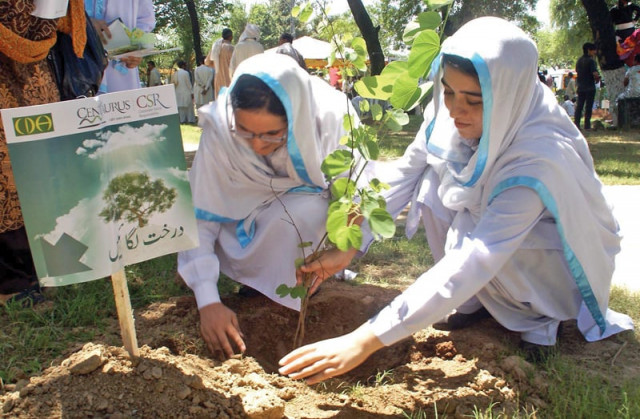Environmental future: People plant trees ‘today’ to save ‘tomorrow’
Experts say country is already witnessing extreme weather events

Students take part in a tree plantation drive in Islamabad.
PHOTO: FILE
The move was part of the government’s "Plant for Pakistan" campaign, aimed at protecting the country from pollution and climate change.
Kazmi said he brought his kids to plant trees so that they could learn the importance of saving the earth from the adverse effects of climatic changes. "I want them to know that if we plant a tree today, it will save their tomorrow," Kazmi told Xinhua. Prime Minister Imran Khan had kicked off the drive earlier that day as part of his "Ten Billion Trees Tsunami" by planting a sapling himself in the hilly region of Haripur in Khyber-Pakhtunkhwa.
The campaign is part of government efforts to combat climate change by planting trees across the country.
Amin Aslam, the adviser to the prime minister on climate change, said that trees were planted and distributed freely across the country with the objective of motivating the public to make Pakistan greener.
Irfan Nizai, the director of the Environment Directorate of the Islamabad Metropolitan Corporation (IMC), said that to create ideal atmospheric conditions, it is important that 20 per cent of the country should be under forest cover. Pakistan, on the other hand, has less than two per cent under green cover.
"The government is now focusing on this issue to control the extreme weather conditions which are posing a threat to our agro-economy and also making living conditions harder for people," Niazi told Xinhua.
In the first step, he said that around 1.5 million trees will be planted in various areas of the country. In the next step, they will provide saplings to schools where each student will be responsible for planting one sapling.
"It will make the student a guardian of the tree and he will be responsible for watering it and taking care of it, giving him a sense of responsibility and motivating him to plant more trees," he said.
Khalid Malik, director of the Pakistan Meteorological Department, told Xinhua that Pakistan is the seventh most vulnerable country to climate change in the world and one of the major reasons for that is deforestation.
"A country's vulnerability to climate change is not only determined by changes in weather pattern but also the efforts which government and residents are making to control the effects of the changing weather," he said.
Malik added that deforestation in the country has taken a serious toll on climate but no one cared about planting new trees which have resulted in harsher weather conditions.
The climate and pollution issues have been worsening in recent years with a recent World Health Organisation global air quality survey finding that neighbouring Rawalpindi had the second most polluted air around the world, behind first placed Peshawar.
Uzair Qamar, a professor for water resource management and engineering at the University of Agriculture in Faisalabad, said that planting trees at the individual as well as state level would help mitigate climate change to a great extent. Qamar told Xinhua that recently, extreme weather events were being witnessed in Pakistan owing to the lack of trees.
When more trees are planted, they will convert excess carbon dioxide in the atmosphere into healthy ecosystems, resulting in moderate weather condition.
"It is a natural phenomenon that spring is followed by winter and autumn follows summer to give people some time to adapt themselves with the new weather, however, in Pakistan spring and autumn are nearly extinct due to the climatic changes mainly due to deforestation."
Published in The Express Tribune, September 7th, 2018.


















COMMENTS
Comments are moderated and generally will be posted if they are on-topic and not abusive.
For more information, please see our Comments FAQ